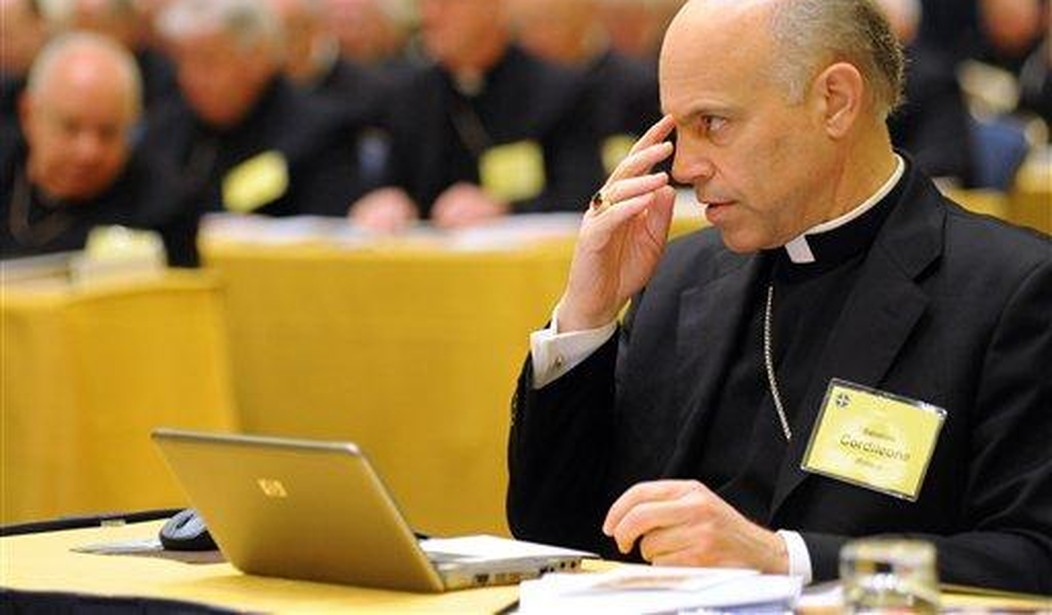Just how does the Catholic Church deal with elected officials who identify as devout members but espouse policies antithetical to church teaching? Long before legalized abortion became prevalent, Archbishop Salvatore Cordileone wrote in yesterday’s Washington Post, the church used excommunication as a lever to ensure faithful support for church teachings and the avoidance of leading others to sin.
People have forgotten about the Catholic Church’s efforts to defeat segregation, and Cordileone thinks it’s time for a refresher course:
The example of New Orleans Archbishop Joseph Rummel, who courageously confronted the evils of racism, is one that I especially admire. Rummel did not “stay in his lane.” Unlike several other bishops throughout this country’s history, he did not prioritize keeping parishioners and the public happy above advancing racial justice. Instead, he began a long, patient campaign of moral suasion to change the opinions of pro-segregation White Catholics.
In 1948, he admitted two Black students to New Orleans’s Notre Dame Seminary. In 1951, he ordered the removal of “white” and “colored” signs from Catholic churches in the archdiocese. In a 1953 pastoral letter, he ordered an end to segregation throughout the archdiocese of New Orleans, telling White Catholics that, because their “Colored Catholic brethren share … the same spiritual life and destiny,” there could be “no further discrimination or segregation in the pews, at the Communion rail, at the confessional and in parish meetings.”
In 1955, Rummel closed a church for refusing to accept a Black priest. In a 1956 pastoral letter, he declared: “Racial segregation as such is morally wrong and sinful because it is a denial of the unity and solidarity of the human race as conceived by God in the creation of Adam and Eve.” On March 27, 1962, Rummel formally announced the end of segregation in the New Orleans Catholic schools.
Many White Catholics were furious at this disruption of the long-entrenched segregationist status quo. They staged protests and boycotts. Rummel patiently sent letters urging a conversion of heart, but he was also willing to threaten opponents of desegregation with excommunication.
On April 16, 1962, he followed through, excommunicating a former judge, a well-known writer and a segregationist community organizer. Two of the three later repented and died Catholics in good standing.
Was that an example of “weaponizing the Eucharist,” as some accuse Catholic bishops of doing over abortion? Cordileone says no, and furthermore the issue in abortion is more acute:
Abortion is therefore the most pressing human rights challenge of our time. Can we pastors speak softly when the blood of 60 million innocent American children cries out for justice? When their mothers are condemned to silence, secretly suffering the injuries of the culture of “choice”?
And he draws a very clear line in the sand here:
You cannot be a good Catholic and support expanding a government-approved right to kill innocent human beings.
You cannot be a good Catholic and do a lot of things the church teaches against, of course. That is why we have the sacrament of reconciliation — but that requires us to recognize and confess our sins, and at least have the intent to sin no more. (That’s the tough part, as I can tell you from personal experience.) The stubborn clinging to sin, refusal to admit to it, and the intent to keep sinning negate the value of confession. It puts the person outside of the communion of the Church, and the teaching here is clear: stubborn refusal to abide by church teaching eventually requires excommunication, which would be just a formal recognition that the person refuses to be Catholic in faith.
That would be true of any Catholic, but of course, priests and bishops don’t necessarily know each congregant’s position on abortion. Catholic politicians, on the other hand, make those positions well known. If they persist in their refusal to abide by church teachings on abortion, then they have made the choice to not be Catholic. That is, of course, their choice, and one has to wonder why they insist on defying this core belief in the sanctity of human life at conception while claiming status as a Catholic.
I’ll have more on this today with Archbishop Cordileone when I guest host on Relevant Radio’s Drew Mariani Show. He will be our first guest at 3 pm ET. Be sure to tune in.








Join the conversation as a VIP Member